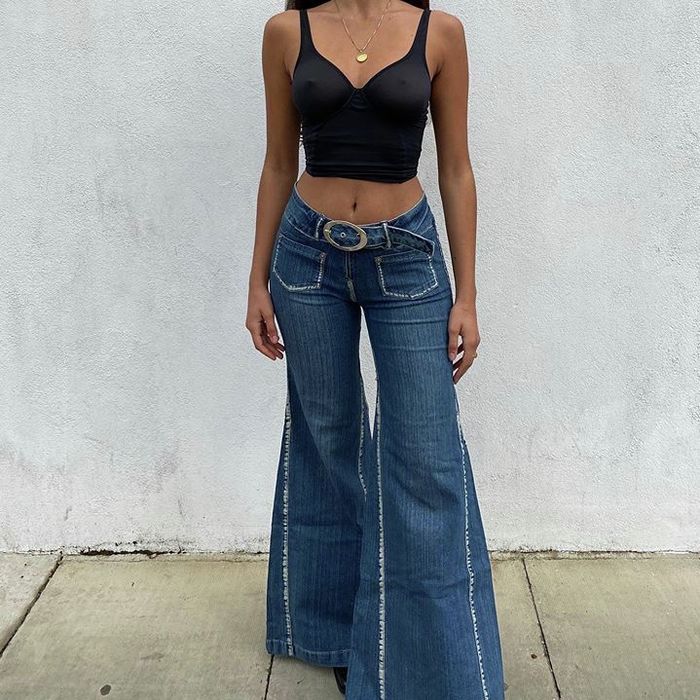Depop: It’s a love-hate relationship
Columnist and Depop veteran Amy Reid discusses why she’s abandoning the online vintage giant
We’ve all seen how immeasurably the age of the internet has impacted the fashion industry. On the one hand, it catapulted the fast fashion industry to the top by condensing the trend cycle and, on the other, boosted the vintage and sustainable fashion scene. Budget vintage has become accessible, offering a sustainable alternative to cheap fast-fashion favourites, and an absolute field day for passionate-yet-broke vintage lovers like myself.
“The new professional era of the app has left its old magic in the mud”
Launched in 2011, Depop grew a reputation for being the primary online destination for cool, youthful, affordable garments, featuring a user-friendly peer-to-peer system. It helped democratise access to the vintage and independent market, for both buyers and sellers. Platforms like Depop have transformed virtual car-boot sales to professional platforms from which individuals have built conscientious international brands. They allow anyone with skill and a vision to start making their mark rapidly and independently. Take for instance Susamusa, a young, ethical brand that began on Depop, and is now worn by the likes of supermodel Bella Hadid.
The app must be celebrated for allowing young designers to launch ethical, sustainable, high-quality pieces, as well as for helping make secondhand fashion mainstream. However, the new professional era of the app has left its old magic in the mud. The platform’s free, scarcely regulated marketplace and totally accessible nature make it the perfect breeding ground for the inflation of the resale market.
Today, Depop is awash with professional vintage resale businesses and simply cheeky individuals hiking up prices excessively. Anyone can sell on the platform, and if you can create enough hype around a brand, people will pay any ludicrous asking price.
Hyper-inflation: Madison Beer and the Morgan de Toi Cami Saga/Shambles/Fiasco/Hellscape.
An example of this that has kept me up night after night is the journey of an unassuming camisole top from iconic 90s/early 2000s high-street, mid-range brand Morgan de Toi.
A quick explanation for those who do not dream about this event nightly. The year is 2020. Madison Beer wears the aforementioned vintage camisole top:
She looks good doing so. And chaos ensues. Those who were lucky enough to have a trendy older sister were selling theirs to the highest bidder — usually for anywhere between £100-£300 at the height of Depop’s collective thirst for this pretty, but admittedly pedestrian, item of clothing.
Was the top cute? Yes. Did I attempt to find a clueless individual drastically underselling it on eBay so I could claim the filthy reward for myself but was ultimately unsuccessful? Yes, don’t tell anyone.
“Depop is a no-go unless you plan on surviving on a diet of meal deals, shoplifting, and Pot Noodle indefinitely”
For me, this was a turning point. I had been an avid Depop user for a few years already, slowly watching it become more and more profit-hungry. It was time for me to go. Trying to shop for late 90s and early 00s pieces is becoming unbearable. After wading through Shein clothing falsely hash-tagged as ‘vintage’, and someone charging a month’s rent for a pair of moth-eaten corduroy trousers, the good stuff has been marked up so much that it has become more expensive to buy secondhand than in a high-street shop. Buying on Depop has finally, and perhaps inevitably, become more expensive than fast fashion.
The reality of today’s Depop is that it’s dominated by professional sellers rather than ordinary people hoping to make a bit of extra cash from a wardrobe clear-out. In other words, Depop is a no-go unless you plan on surviving on a diet of meal deals, shoplifting, and Pot Noodle indefinitely.
So what next?
As Depop becomes increasingly void of bargains, new platforms such as Vinted and Shpock are taking its place. Of course, resale OG eBay and the unwavering Mill Road charity shops will always be there to support me, but Vinted is now my go-to clothing provider. Most items go for under a tenner and the app even encourages sellers to price lower to keep its ethos alive.
I now only open up Depop if I feel like treating myself majorly, and then inevitably swiftly close it after scrolling too far and seeing another children’s graphic tee being modelled by a grown woman.For penniless vintage fashion fans, Depop is over, and Vinted truly is the way to go. We’ll just have to hope that history doesn’t repeat itself.
 Features / Cambridge: where toxic productivity turns rest into a radical act8 April 2025
Features / Cambridge: where toxic productivity turns rest into a radical act8 April 2025 News / Rowing row continues as Oxford and Cambridge scrap women’s trial race9 April 2025
News / Rowing row continues as Oxford and Cambridge scrap women’s trial race9 April 2025 News / Under 3% of applicants for Cambridge academic jobs are successful7 April 2025
News / Under 3% of applicants for Cambridge academic jobs are successful7 April 2025 News / Uni to ‘review’ tripos rankings and weekend lectures in undergrad teaching overhaul10 April 2025
News / Uni to ‘review’ tripos rankings and weekend lectures in undergrad teaching overhaul10 April 2025 Comment / Death of the June Event?9 April 2025
Comment / Death of the June Event?9 April 2025





